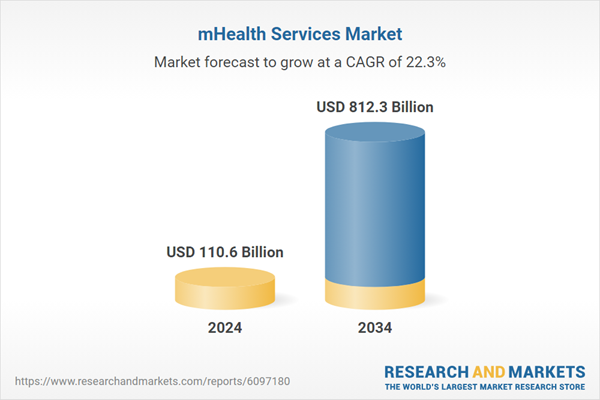Supportive government policies and digital health initiatives are further enhancing the adoption of mHealth, especially in technologically advanced economies. In the U.S., these services have gained momentum due to growing funding, reimbursement programs, and healthcare reforms focused on digitization. One prominent driver of the U.S. market is the push to expand medical access in remote or underserved locations. These digital platforms help reduce hospital admissions and emergency visits while ensuring patients stick to preventive care regimens. Realtime alerts, automated reminders, and digital education modules also help streamline treatment adherence.
Healthcare system strengthening services are witnessing substantial growth, expected to rise at a 23.6% CAGR through 2034. These services utilize mobile technology to improve disease tracking and resource allocation. From real-time surveillance of outbreaks to remote health data capture, mobile-enabled systems enhance public health responses and allow personalized tracking of patient metrics, improving outcomes and lowering costs tied to readmissions.
By application, the general healthcare and fitness segment accounted for 43.1% share in 2024. This segment continues to thrive due to its affordability, ease of integration, and compatibility with preventive care strategies. Providers now leverage mobile health platforms not only to track wellness metrics but also to personalize care and manage multiple conditions with flexible tools. The segment’s ability to adapt across different use cases ensures its leading role in future mobile health innovation.
United States mHealth Services Market generated USD 34.7 billion in 2023. The country's rapid expansion in this sector highlights its strong infrastructure, rising demand for remote care, and early adoption of digital health technologies. Mobile health solutions are playing a critical role in extending medical support to underserved and remote communities that often face barriers due to geographic isolation or extreme weather conditions. These platforms enhance access to care by delivering virtual consultations, remote monitoring, and continuous health tracking.
Key players in the market include Samsung Electronics, Google, Amwell, AirStrip Technologies, Teladoc Health, Veradigm, Telefónica, Apple, Orange, Vodafone Group, AliveCor, SoftServe, Spruce Health, Force Therapeutics, and Qualcomm Technologies. To strengthen their foothold, companies in the mHealth market focus on developing AI-powered monitoring tools, expanding partnerships with healthcare providers, and enhancing user interfaces for improved patient experiences. Strategic investments in wearable device integration, cloud-based platforms, and regional market expansion also help these firms stay ahead in a highly competitive, innovation-driven sector.
Comprehensive Market Analysis and Forecast
- Industry trends, key growth drivers, challenges, future opportunities, and regulatory landscape
- Competitive landscape with Porter’s Five Forces and PESTEL analysis
- Market size, segmentation, and regional forecasts
- In-depth company profiles, business strategies, financial insights, and SWOT analysis
This product will be delivered within 2-4 business days.
Table of Contents
Companies Mentioned
The companies featured in this mHealth Services market report include:- AirStrip Technologies
- AliveCor
- Amwell
- Apple
- Force Therapeutics
- Orange
- Qualcomm Technologies
- Samsung Electronics
- SoftServe
- Spruce Health
- Teladoc Health
- Telefónica
- Veradigm
- Vodafone Group
Table Information
| Report Attribute | Details |
|---|---|
| No. of Pages | 133 |
| Published | May 2025 |
| Forecast Period | 2024 - 2034 |
| Estimated Market Value ( USD | $ 110.6 Billion |
| Forecasted Market Value ( USD | $ 812.3 Billion |
| Compound Annual Growth Rate | 22.3% |
| Regions Covered | Global |
| No. of Companies Mentioned | 16 |









